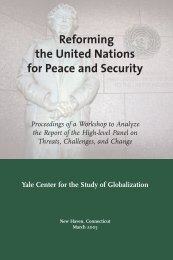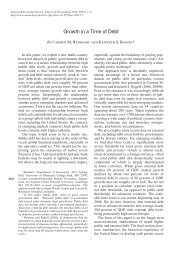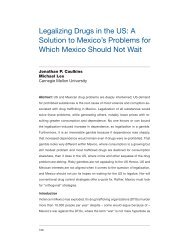The collapse of global trade, murky protectionism, and the crisis:
The collapse of global trade, murky protectionism, and the crisis:
The collapse of global trade, murky protectionism, and the crisis:
Create successful ePaper yourself
Turn your PDF publications into a flip-book with our unique Google optimized e-Paper software.
VOX<br />
Research-based policy analysis <strong>and</strong> commentary from leading economists<br />
crimination in public procurement. Among <strong>the</strong>se are <strong>the</strong> WTO's Government<br />
Procurement Agreement (GPA), <strong>and</strong> bilateral <strong>trade</strong> agreements with Australia, Jordan,<br />
<strong>and</strong> Chile as well as plurilateal <strong>trade</strong> agreements such as <strong>the</strong> North American Free<br />
Trade Agreement (NAFTA). <strong>The</strong>se agreements reflect decades <strong>of</strong> US diplomacy that has<br />
sought to open procurement markets around <strong>the</strong> world. <strong>The</strong> Obama administration,<br />
alarmed by <strong>the</strong> prospect <strong>of</strong> a public procurement <strong>trade</strong> war, interceded <strong>and</strong> helped<br />
broker a less harmful compromise. While Section 1605 <strong>of</strong> <strong>the</strong> US stimulus legislation<br />
retained certain "Buy American" requirements, <strong>the</strong> legislation ultimately requires<br />
implementation in accordance with existing commitments under international<br />
agreements.<br />
While that compromise resolved many <strong>of</strong> <strong>the</strong> legal issues posed by <strong>the</strong> legislation's<br />
"Buy American" provisions, <strong>the</strong> broader political problem remained. Faced with a <strong>crisis</strong>,<br />
<strong>the</strong> US seemed poised to quickly jettison its decades-old leadership role in, <strong>and</strong><br />
commitment to, open procurement markets <strong>and</strong> <strong>the</strong> pursuit <strong>of</strong> value for money. This<br />
sentiment emboldened free-<strong>trade</strong> sceptics <strong>and</strong> empowered states inclined to favour<br />
domestic firms <strong>and</strong> industries in <strong>the</strong>ir own procurement systems. To repair <strong>the</strong> damage<br />
left by this imbroglio, leaders must clarify that, as a matter <strong>of</strong> law <strong>and</strong> principle,<br />
<strong>the</strong> world's largest economies remain committed to open markets, in procurement<br />
<strong>and</strong> o<strong>the</strong>rwise.<br />
Protectionism is bad for procurement<br />
Putting aside <strong>trade</strong> considerations, <strong>protectionism</strong> undermines <strong>the</strong> fundamental business-based<br />
<strong>and</strong> value-oriented underpinnings <strong>of</strong> successful procurement regimes.<br />
While <strong>protectionism</strong> no doubt serves a political purpose, from a public procurement<br />
policy perspective, research <strong>and</strong> experience demonstrate that it is bad policy.<br />
Protectionism restricts markets <strong>and</strong> limits competition<br />
Yet competition is one <strong>of</strong> <strong>the</strong> foundations upon which effective public procurement<br />
regimes depend. Faced with limited access to <strong>the</strong> world's best (<strong>and</strong> best-priced) firms,<br />
facilities, materials, <strong>and</strong> talent, governments inevitably pay premiums for what <strong>the</strong>y<br />
buy. Past studies routinely identify welfare losses in those countries with high barriers<br />
to procurement <strong>trade</strong>.<br />
For example, as with many stimulus packages around <strong>the</strong> world, one <strong>of</strong> <strong>the</strong> stated<br />
aims <strong>of</strong> <strong>the</strong> pending US stimulus package is to rebuild crumbling infrastructure. If,<br />
however, protectionist impulses prevail, favouring domestic steel in US infrastructure<br />
spending could result in <strong>the</strong> government paying above-market prices for raw materials;<br />
as a result, <strong>the</strong> infrastructure stimulus will result in fewer workers employed on<br />
fewer public works projects, <strong>and</strong> <strong>the</strong> public ultimately will enjoy fewer miles <strong>of</strong><br />
improved roadways, bridges, <strong>and</strong> renovated classrooms.<br />
Protectionism increases transaction costs<br />
Artificial constructs that favour domestic over foreign end products based upon percentages<br />
<strong>of</strong> materials or labour or nuances <strong>of</strong> <strong>the</strong> manufacturing or "transformation"<br />
process are difficult <strong>and</strong> time consuming to administer. <strong>The</strong>se devices sap human<br />
resources that could be better employed seeking optimal value-based purchasing outcomes.<br />
Moreover, many <strong>of</strong> <strong>the</strong>se rules ignore <strong>the</strong> realities, <strong>and</strong> reduce <strong>the</strong> efficiency,<br />
<strong>of</strong> <strong>the</strong> <strong>global</strong> supply chain.<br />
Experience shows that customer agencies or bureaus – tasked with actually provid-<br />
88





